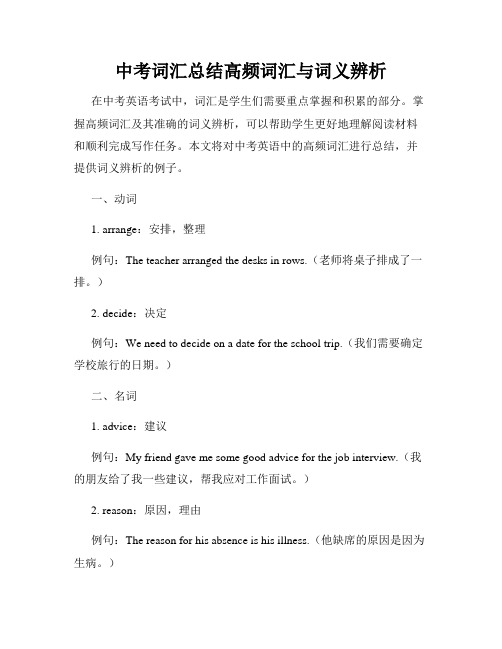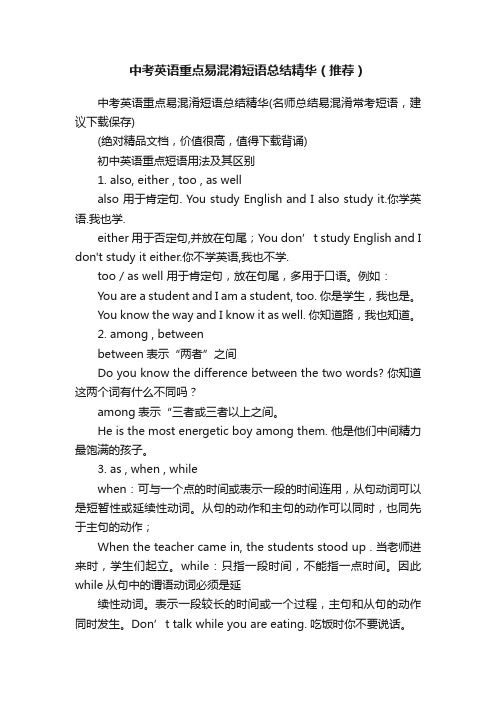中考中常用重要英语短语区别
九年级英语重点词汇短语词义辨析归纳(全一册)

九年级英语重点词汇短语词义辨析Shiely07222021年2月2日辨析aloud,loud与loudly考点词义及用法例句aloud (adv.)意为“大声地”,与call ,shout ,cry 等连用;意为“出声地”,与read 等连用Please read the text aloud.请大声地朗读课文。
loud (adj./adv.)作为adj.意为“大声的”,与voice ,laughter 等连用;作为adv.意为“响亮地”,与talk ,speak ,sing ,laugh 等连用The music is too loud.Please turn it down.这音乐大吵了,请把声音调低些。
loudly (adv.)意为“高声地”,含有“喧闹”的意思。
与knock ,ring 等连用Suddenly the bell on the wall rang loudly.墙上的铃突然大声地响起来。
辨析discover和invent考点用法例句discover v.意为“发现;发觉”,指某种自然界本来已存在,但以前未被发现或认识的事物Why not discover what you enjoy and do that ?为什么不去发现你所喜欢的然后去做呢?invent v.意为“发明”,指创造出原来自然界不存在的东西,如工具、汽车、电视等Edison invented the electric light.爱迪生发明了电灯。
辨析so…that…与so that考点词义及用法例句so…that…so+adj./adv.+that…意为“如此……以至于……”,引导结果状语从句The girl is so young that she can't dress herself.这个女孩还太小,不会自己穿衣服。
so that引导目的状语从句,表示“以便;为了”,与in order that 同义He got up early so that he could catch the early bus.他早起以便赶上早班车。
中考词汇总结高频词汇与词义辨析

中考词汇总结高频词汇与词义辨析在中考英语考试中,词汇是学生们需要重点掌握和积累的部分。
掌握高频词汇及其准确的词义辨析,可以帮助学生更好地理解阅读材料和顺利完成写作任务。
本文将对中考英语中的高频词汇进行总结,并提供词义辨析的例子。
一、动词1. arrange:安排,整理例句:The teacher arranged the desks in rows.(老师将桌子排成了一排。
)2. decide:决定例句:We need to decide on a date for the school trip.(我们需要确定学校旅行的日期。
)二、名词1. advice:建议例句:My friend gave me some good advice for the job interview.(我的朋友给了我一些建议,帮我应对工作面试。
)2. reason:原因,理由例句:The reason for his absence is his illness.(他缺席的原因是因为生病。
)三、形容词1. polite:有礼貌的例句:Emily is always polite to her elders.(艾米莉对长辈总是非常有礼貌。
)2. honest:诚实的例句:He is an honest person and never tells lies.(他是一个诚实的人,从不说谎。
)四、副词1. quickly:快速地例句:She finished the race quickly and won the first place.(她迅速完成了比赛并获得了第一名。
)2. quietly:安静地例句:Please read quietly in the library.(请在图书馆安静地阅读。
)词义辨析:1. forget与remember虽然forget和remember都有“记住”的意思,但用法上有所不同。
forget表示“忘记”,后接名词或动名词,而remember表示“记得”,后接名词、动名词、动词-ing形式或从句。
初中英语重点短语辨析

初中英语重点短语辨析1. be made of / be made fromⅠ. be made of “由……制成/造”成品看得出原料。
如:The desk is made of wood. 这张桌子是木头制成的。
Ⅱ. be made from “由……制造/成”成品看不出原料。
如;Paper is made from rags.纸是由破布做的。
(已看不出原料)2. be pleased with/ at/ toⅠ. be pleased with “对……人/物,感到满意”介词with后接人或物。
如:① Both Mark and her mother were pleased with the girl. 马克和他妈妈都有喜欢这个女孩。
② I wasn’t very pleased with / at my exam results. 我对自己的考试成绩不太满意。
Ⅱ. be pleased at “对……某事/物,感到满意”。
介词at 常与事物搭配使用。
He was very pleased at the news.他对这个消息感到很满意。
Ⅲ. be pleased to “乐意……;因……而高兴”。
to 不是介词,而是小品词。
后接动词原形。
如:① I shall be pleased to go. 我将乐意去。
② We are quite pleased to be working in this country. 能在这个国家工作,我们是十分高兴的。
3. be sure of/ be sure to do/ be sure thatⅠ.be sure of “确信对……有把握”后接名词、代词或动词-ing 形式,表对客观事物有肯定的认识和判断,主语必须是人。
如:① As David joined our team, we are sure of winning the game this time.由于David参加了我们的球队,我们这次有把握取胜。
【中学英语】常考!易错!重点!短语辨析(四)

【中学英语】常考!易错!重点!短语辨析(四)1. ask / inquire/ questionⅠ. ask “问、询问”是最普通的用语,通常表示只是为了获得回答或了解某事而提问。
如:① I asked him if he could come. 我问他能不能来。
② I’ll ask him how to get there. 我要问他怎样去那儿。
Ⅱ. inquire “问、询问”表查究,调查的意思。
如:① I have inquired of him whether he could help me.我已问过他是否能帮助我。
② She came to inquire about her friend’s health.她来询问她朋友的健康情况。
③ He inquired of me about our work.他向我了解了我们的工作情况。
Ⅲ. question “询问、审问、提问”含有提出一连串问题的意味。
如:① I questioned him a bout the matter.我问过他这件事。
② He was questioned by the police. 他受到警察的审问。
2. ask/ ask forⅠ. ask “问”后接一个宾语或双宾语。
如:① Don’t ask me, I don’t know.别问我,我不知道。
② Then ask your friend the same questions.然后问你的朋友同样的问题。
Ⅱ. ask vi “要求”“邀请”。
后接不定式或复合句宾语。
如:① He asked to join the PLA. 他要求参加人民解放军。
② The villagers always ask them to stay for lunch. 乡亲们总是请他们留下来吃午饭。
Ⅲ. ask for “要求找到某人或某物”在不同情况下有不同的译法。
如:① He sat down and asked for a cup of tea. 他坐下来要了一杯茶。
中学初中英语语法——英语重点词汇区别

on earth 与on the earth 的区别on earth有三层含义和用法:1.作“到底”或“究竟”解,置于what,when等疑问词之后,以加强问句的语气。
例如:①What on earth is it?这到底是什么东西?②Why on earth did you tell a lie?你究竟为什么要说谎?2.作“当今”或“世界上”解,用于最高级之后,以加强语气。
例如:He said,“I'm the happiest man on earth.”他说:“我是世界上最幸福的人。
”3.用于否定词之后,作“一点儿也不”解,以加强否定的语气。
例如:It's no use on earth.这一点儿也没有用。
He said,“Nothing on earth can change my mind.”他说:“无论什么也不能改变我的主意。
”on the earth作“在地球上”解。
例如:We live on the earth.我们生活在地球上。
aim to 与aim at 的区别就“aim”这个词本身来讲,有两种词性,一种是动词“瞄准,对准,打算”等之意,另一种是名词“瞄准,目标,目的,意图”等之意。
就短语来说,“aim to”是动词短语,“立志要做某事,打算做某事”等之意,后接动词原形,而“aim at”也是一个动词短语,“瞄准,以……为目标,针对,追求”等意,其后主要接名词、代词、动名词。
例如:Tom\'s son aims to be a famous writer. 汤姆的儿子立志要成为一名著名的作家。
He is aiming at the target carefully. 他正认真地瞄准目标。
dress, wear, put on, have on的区别区别如下:1. 从所接宾语来看:dress 要接“人”作宾语(不接“衣”作宾语),而其余的则要接“衣”作宾语(而不接“人”作宾语)。
中考英语重点易混淆短语总结精华(推荐)

中考英语重点易混淆短语总结精华(推荐)中考英语重点易混淆短语总结精华(名师总结易混淆常考短语,建议下载保存)(绝对精品文档,价值很高,值得下载背诵)初中英语重点短语用法及其区别1. also, either , too , as wellalso 用于肯定句. You study English and I also study it.你学英语.我也学.either 用于否定句,并放在句尾;You don’t study English and I don't study it either.你不学英语,我也不学.too / as well 用于肯定句,放在句尾,多用于口语。
例如:You are a student and I am a student, too. 你是学生,我也是。
You know the way and I know it as well. 你知道路,我也知道。
2. among , betweenbetween表示“两者”之间Do you know the difference between the two words? 你知道这两个词有什么不同吗?among表示“三者或三者以上之间。
He is the most energetic boy among them. 他是他们中间精力最饱满的孩子。
3. as , when , whilewhen:可与一个点的时间或表示一段的时间连用,从句动词可以是短暂性或延续性动词。
从句的动作和主句的动作可以同时,也同先于主句的动作;When the teacher came in, the students stood up . 当老师进来时,学生们起立。
while:只指一段时间,不能指一点时间。
因此while从句中的谓语动词必须是延续性动词。
表示一段较长的时间或一个过程,主句和从句的动作同时发生。
Don’t talk while you are eating. 吃饭时你不要说话。
中考重点常见词汇和短语的辨析
中考重点常见词汇和短语的辨析随着中考的来临,对于考生来说,熟练掌握常见词汇和短语的辨析是非常重要的。
在考试中,常常会出现多个相似意义的词汇和短语,如果不能准确辨析它们,就很容易出错。
因此,在备考期间,我们应该加强对这些词汇和短语的辨析能力的训练。
一、辨析形容词similar与same1. similar意为“相似的”,强调相似而不完全相同。
例:His new car is similar to mine, but it's a different color.2. same则意为“相同的”,完全一样,没有任何差别。
例:Our bikes are the same. We bought them together.二、辨析动词borrow与lend1. borrow表示“借入”,指借别人的东西。
例:Could I borrow your pen? I forgot to bring mine.2. lend表示“借出”,指把自己的东西借给别人。
例:Can you lend me your book? I want to read it.三、辨析介词beside与besides1. beside意为“在……旁边”,常用于表示位置。
例:The cat is sitting beside the table.2. besides意为“除了……之外”,常用于表示除了某事物或某人之外还有其他的事物或人。
例:Besides apples, we also have oranges.四、辨析动词learn与teach1. learn表示“学习”,指通过努力和训练获取新的知识或技能。
例:I learn English every day.2. teach表示“教”,指教授知识或技能给他人。
例:She teaches us math every Monday.五、辨析连词unless与if1. unless意为“除非”,相当于if not。
有关初中英语重要短语用法及区别好
初中英重要短的用法及区1.on, in 和 with.(1).on:表示使用通工具、信息或媒,乘坐交通工具等;I don ’ t want to talk about it on the phone.(2).in :使用言文字等媒介;Can you speak it in English?(3.)with :借助详细的手段或工具。
Don’ t write it with a red pen.2.at , on , in 三者都能够表示“在⋯⋯的候”。
(1) at:表示在哪个刻用;表示点。
I get up at six o’clock in the morning . 我清晨六点起床。
(2) On:表示在哪一天,哪一天的清晨(下午、夜晚);on Wednesday , on Sunday morning , on May I , on a cold morning in 1936 (3) in:表示在哪一年(季、月),在上午,下午等。
in September , in the morning , in the afternoon3. spend, pay,cost, take(1)Sb. Spend⋯on sth.某人花了⋯(、金)在某事上。
I spend ten yuan on the book..(2)spend(in) doing sth. 某人花了⋯(、金)做某事。
She spent two hours in drawing the house.(3)Sb. pay ⋯ for⋯sth.某人某物花了⋯。
I paid 50 yuan for the clothes.(4)Sth. cost sb. ⋯某物花了某人⋯。
It cost us five dollars.(5)It takes/took sb. ⋯ to do sth.花了某人⋯(、金)做某事。
It takes us ten minutes to brush my teeth every day.4.too much, too many, much tootoo much + 不行数名too many + 可数名much too + 形容、副、(1) There is too much milk in the basket.(2)She ate too many biscuits yesterday morning.(3)He runs much too quickly.(4)The chair is much too expensive.5.not⋯until &untilnot ⋯ until直到⋯才⋯(主句是短性)(1)He didn’ t go to beduntil his mother came back..until向来到⋯(主句中使用延性)(2)I study hard until it is midnight every day.6.few, a few; little , a little.固然都表示“少” ,但·f ew, a few 是可数的 , little, a little 是不行数的。
中考英语常用短语的区别与运用
中考英语常用短语的区别与运用中考英语常用短语的区别与运用初中英语中有很多常用短语意义相近却不相同;学习中需要理解、对比记忆。
同时这也是初中英语学习的重点和中考英语必考的知识。
希望同学们多总结记忆。
下面店铺为大家整理了中考英语常用短语的区别与运用,希望对大家有所用处!1.happen , take place二者都有“发生”的意思。
happen指事情的发生,往往带有"偶然"的意思。
It happens that I am free today. 恰好今天我没有事。
take place指事先安排或策划好而后发生,没有"偶然"的意思。
2. must, have tomust表示说话人的主观看法;而have to则表示客观需要。
mustn\'t意为“不可以;不允许”;don\'t have to意为“不必”。
如:(1)My father had to work when he was ten years old。
(2)The play is not interesting. I really must go now。
3. arrive , reach , get to三者都有“到达”之意。
reach为及物动词。
They reached Tianjin yesterday。
昨天他们到达天津。
arrive为不及物动词,后面接介词in或at。
get to常用于口语,可代替前二者。
4.because , because of二者均表示“因为”because是连词,引导状语从句。
We stayed at home because it rained. 因为下雨,我们呆在家。
because of是短语介词,后面接名词性词语。
We stayed at home because of the rain . 因为下雨,我们呆在家。
5. in front of, in the front ofin front of…意思是"在……前面",指甲物在乙物之前,两者互不包括;其反义词是behind(在……的后面)。
初中英语常用词语辨析大全
初中英语常用词语辨析A...。
...。
...。
..。
....。
.。
...。
.......。
.。
..。
.。
..。
.。
.。
1。
at the moment\in a moment\for a moment\at the moment=right now”此时此刻”,用于现在时.in a moment = very soon “很快,立即”,一般用于将来时的句子.for a moment “此刻,一会儿”表示时间的延续。
[例] He is out at the moment。
此刻他不在家.I will come back in a moment.我一会儿就回来。
Hold on for a moment.请稍候。
.。
..。
.。
......。
...。
.。
..。
.。
.....。
.。
..。
.。
.。
.。
...。
.。
2.a few/ few(1)a few, few 用来修饰可数名词。
(2)a few “有一些”,表示肯定概念,few 几乎没有,表示否定意义。
[例] The man has been here for many years, so he has a few friends。
这个人在这里住了很多年了,他有一些朋友.I am a new comer here, so I have few friends here.我刚来到这里,所以我在这里没有几个朋友。
.。
..。
.。
.。
..。
............。
.。
.。
.。
.。
..。
.。
.。
.。
.。
... 3.a little/ little(1) a little, little 用于修饰不可数名词。
(2) a little “有一些”,表示肯定概念.little “几乎没有",表示否定概念.[例] There is a little water in the glass.杯子里有一些水。
There is little water in the glass, so you can’t drink any.杯子里几乎没有水了,你不可能喝到水了. 。
- 1、下载文档前请自行甄别文档内容的完整性,平台不提供额外的编辑、内容补充、找答案等附加服务。
- 2、"仅部分预览"的文档,不可在线预览部分如存在完整性等问题,可反馈申请退款(可完整预览的文档不适用该条件!)。
- 3、如文档侵犯您的权益,请联系客服反馈,我们会尽快为您处理(人工客服工作时间:9:00-18:30)。
初中英语中有很多常用短语意义相近却不相同;学习中需要理解、对比记忆。
同时这也是初中英语学习的重点和中考英语必考的知识。
1.happen , take place二者都有“发生”的意思。
happen指事情的发生,往往带有"偶然"的意思。
It happens that I am free today. 恰好今天我没有事。
take place指事先安排或策划好而后发生,没有"偶然"的意思。
2. must, have tomust表示说话人的主观看法;而have to则表示客观需要。
mustn\'t意为“不可以;不允许”;don\'t have to意为“不必”。
如:(1)My father had to work when he was ten years old。
(2)The play is not interesting. I really must go now。
3. arrive , reach , get to三者都有“到达”之意。
reach为及物动词。
They reached Tianjin yesterday。
昨天他们到达天津。
arrive为不及物动词,后面接介词in或at。
get to常用于口语,可代替前二者。
4.because , because of二者均表示“因为”because是连词,引导状语从句。
We stayed at home because it rained. 因为下雨,我们呆在家。
because of是短语介词,后面接名词性词语。
We stayed at home because of the rain . 因为下雨,我们呆在家。
5. in front of, in the front ofin front of…意思是"在……前面",指甲物在乙物之前,两者互不包括;其反义词是behind(在……的后面)。
如:He walked in fount of me。
他走在我的前面。
There are some flowers in fount of the house。
房子前面有些花卉。
in the front of 意思是"在某一空间内的前部",即甲物在乙物的范围之内;其反义词是at the back of…(在……范围内的后部)。
如:There is a big deskand a blackboard in the fount of our classroom。
我们的教室前边有一张大桌子和一块黑板。
Our teacher stands in the fount of the classroom。
我们的老师站在教室前6. look , see , watch三者都有“看”的意思。
look是看的过程。
I looked , but saw nothing . 我看了,但什么也没看见。
see是看的结果。
see a film看电影;see a play看戏(话剧)。
watch是看移动的事物或定晴地看。
watch a football match看足球比赛。
watch TV看电视。
7. sometime; sometimes; some time; some timessometime是副词,可与过去时或将来时连用,表示"(在过去)某个时候"或"(在将来)某个时候"。
如: I saw him sometime in May。
some time多数情况下作名词短语,意为"一些时间;一些时候";它还可以作副词词组,用来表示一个未肯定的时刻,此时它可与sometime互换。
如: I\'ll be away for some time。
sometimes是一个表示时间频率的副词,意为"有时候"。
如:Sometimes I help my mother with the housework。
some times是"几次、几倍"之意。
如:They have been there several times。
8. how long, how often, how far, how soonhow long意为"多久、多长时间",主要是对一段时间进行提问,答语通常是(for)three days/weeks/months等时间段,它可用于各种时态。
How long do you stay in Beijing every year? 每年你在北京住多久?how often意为"多久……次、是否经常",用来提问在某一特定的时间进行某个动作的次数,答语通常是always,usually,often,sometimes,once/twice a day/month等。
How often do you get to school very early? 你多久早到校一次?how far意为"多远",对距离提问时用。
How far is that? 那有多远?how soon意为"还要多久",是对从某个基本时间到将来某动作结束或某动作发生这段时间提问,常用在一般将来时态的句子中,其答语通常是"in + 一段时间"。
-How soon can you finish the work? 还要多久你能完成这项工作?-In half an hour. 半小时后。
9. agree with,agree to,agree on两者都有“同意”、“赞成”的意思。
agree with 后面常接表示人或意见(看法)的名词作宾语。
agree with 还有“适合”、“符合”的含义。
如:The climate here doesn\'t agree with him。
他不适合这里的气候。
agree to 后面一般接表示提议、办法、计划之类的名词作宾语。
agree on就…达成一致的意见。
10. across , cross, crossing, through, past(1)cross 意为“横过,穿过”为动词,相当于walk(go,run)acrossLook both ways before you cross the road。
(2)across意为“横过,穿过”为介词,不作动词,不能作谓语,常放在动词之后,如:go acrossHe walked across the field。
(3)through 是介词,含有“从…中间穿越”之意,表示四周含有物体的穿越。
The ball went through the window。
(4)past既可作形容词也可作副词,做副词时有:“穿过,越过”之意。
Will you be going past my house on your way home?(5)crossing意为“渡口,人行横道,(铁路与公路的)交叉点。
All the cars should stop before the zebra crossing。
11.on,in,with(1)on:表示使用通讯工具、信息或传媒,乘坐交通工具等;I don't want to talk about it on the phone。
(2)in:使用语言文字等媒介;Can you speak it in English?(3)with:借助具体的手段或工具。
Don't write it with a red pen。
12.at,on,inat, on, in三者都可以表示"在……的时候"。
(1)at:表示在哪个时刻用;表示时间点。
I get up at six o'clock in the morning . 我早晨六点起床。
(2)On:表示在哪一天,哪一天的早上(下午、晚上);on Wednesday , on Sunday morning , on May I , on a cold morning in 1936(3)in:表示在哪一年(季、月),在上午,下午等。
in September , in the morning , in the afternoon13.few, a few; little , a littl虽然都表示“少”,但·few, a few是可数的, little, a little是不可数的。
·a few, a little含肯定意味,few, little含否定意味。
(1) They have a little ink, don't they? 他们有一点墨水,是吗?(2)They have little ink, do they? 他们几乎没有墨水,是吗?(3)She has a few Chinese friends, doesn't she? 他有几位中国朋友,是吗?(4)She has few Chinese friends, does she?他几乎没有几位中国朋友,是开吗(5)She has a little dog。
她有一只小狗。
14.not … until, untilnot … until 直到…才… (主句动词是短暂性动词)(1)He didn't go to bed until his mother came back。
until 一直到… (主句中使用延续性动词)(2)I study hard until it is midnight every day。
15. spend, pay, cost, take(1)Sb. Spend … on sth. 某人花了…(时间、金钱)在某事上。
I spend ten yuan on the book。
(2)spend (in) doing sth. 某人花了…(时间、金钱)做某事。
She spent two hours in drawing the house。
(3)Sb. pay …for …sth. 某人为某物花了…钱。
I paid 50 yuan for the clothes。
(4)Sth. cost sb. …某物花了某人…钱。
It cost us five dollars。
(5)It takes/took sb. … to do sth. 花了某人…(时间、金钱)做某事。
It takes us ten minutes to brush my teeth every day。
